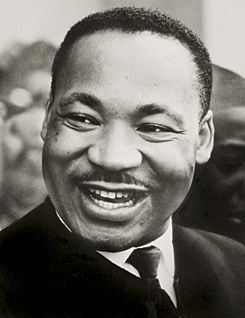It is my hope that today, with the overlap of two important dates for each of these men’s legacies, we can all try to resist the temptation to classify and categorize, and instead allow the words, stories, and actions of these men be considered in all of their rich complexities.
--Lori Adelman,"Today, honoring the legacies
of two civil rights leaders"


What Adelman says here somehow gets me remembering, in history, something as instructional that somebody else says here.
What did you expect to see...? A skinny plant blowing around in the wind? What did you expect to see? A person wearing fancy clothes? No way! People who wear fancy clothes live in palaces. What did you expect to see? A prophet? That's right, and he's more than a prophet. He is the prophet mentioned here 'I send my messenger on ahead of you. He will prepare a road for you.' I tell you, no human in history has been more important than John the Baptizer! Yet the most insignificant person in Heaven's Realm is more important than he!.... If you're willing to accept what they say, he is the Elijah who was meant to come! If you have ears to hear you had better listen!
--Jesus,as translated by Matthew,as translated by Ann Nyland
What Jesus says here somehow gets me remembering, in history, something as instructional that somebody else says here.
As we write our histories of rhetoric, especially as we write women into the tradition, we, like historians in other fields, must continue to resist received notions both of history and of writing history.... As we resist the paternal narrative of rhetorical history, we are all working as if the real and discourse were actually being joined in our texts.... The text of history writing, then initiates a play between the object under study and the discourse performing the analysis. And even the most conscientious history writers play the game.... Consequently, all historical accounts, even the most seemingly objective historical records are stories. And even these stories are selected and arranged according to the selector's frame of reference. Why, then, should we continue to write histories of rhetoric when both writing and history are suspect? when our language is our terministic screen? when the past was not really "there"? and when we agree that there was a past but not what the past really was? It is too late to do otherwise.It's not just what and who we consider today, which is very important, but it's also whether and how we allow ourselves to read and to listen, which is most important to their memory.
--Cheryl Glenn,

No comments:
Post a Comment